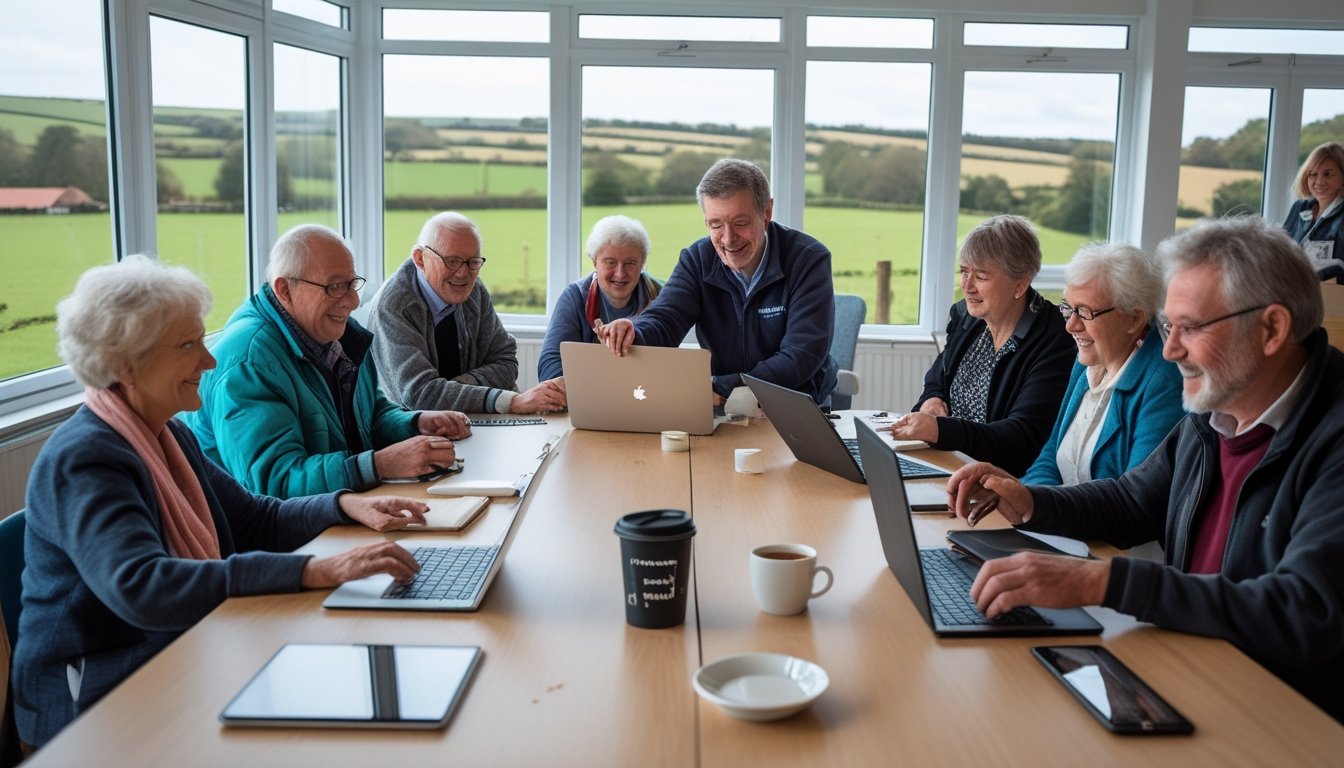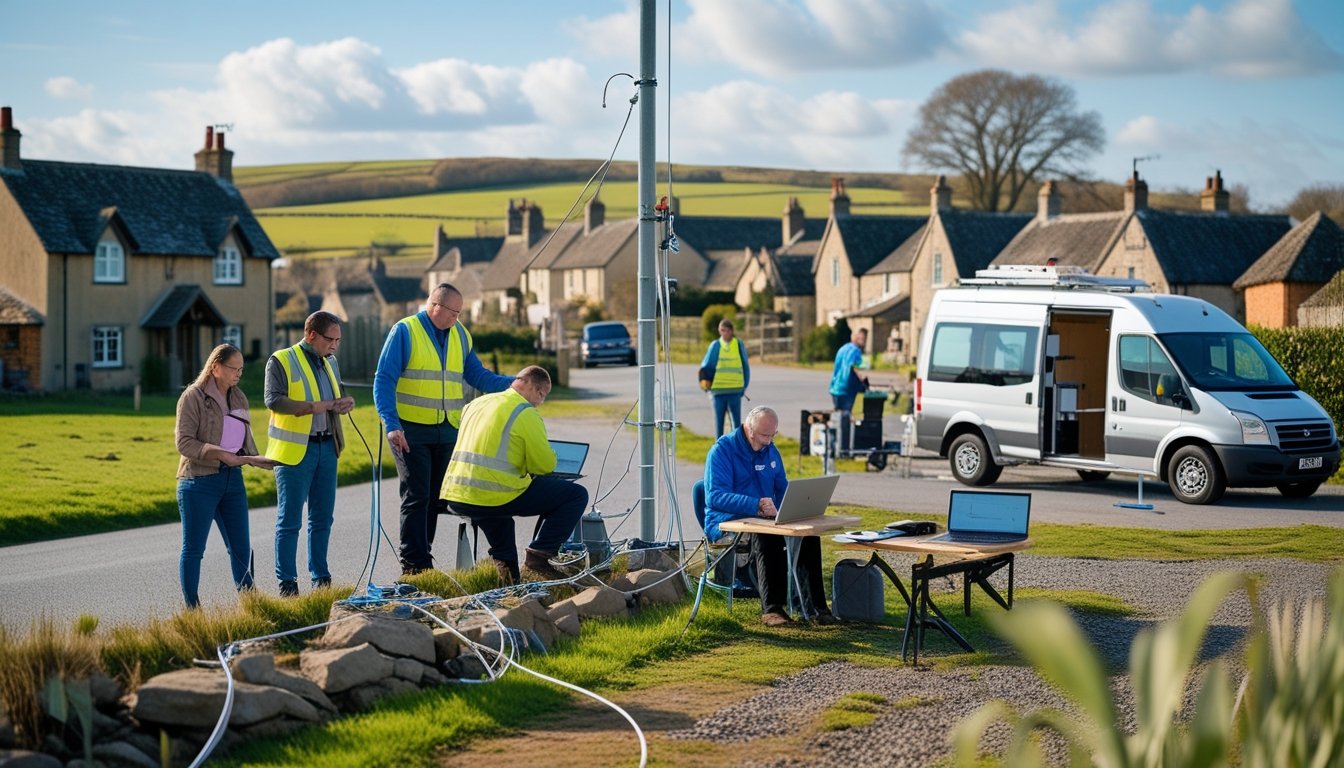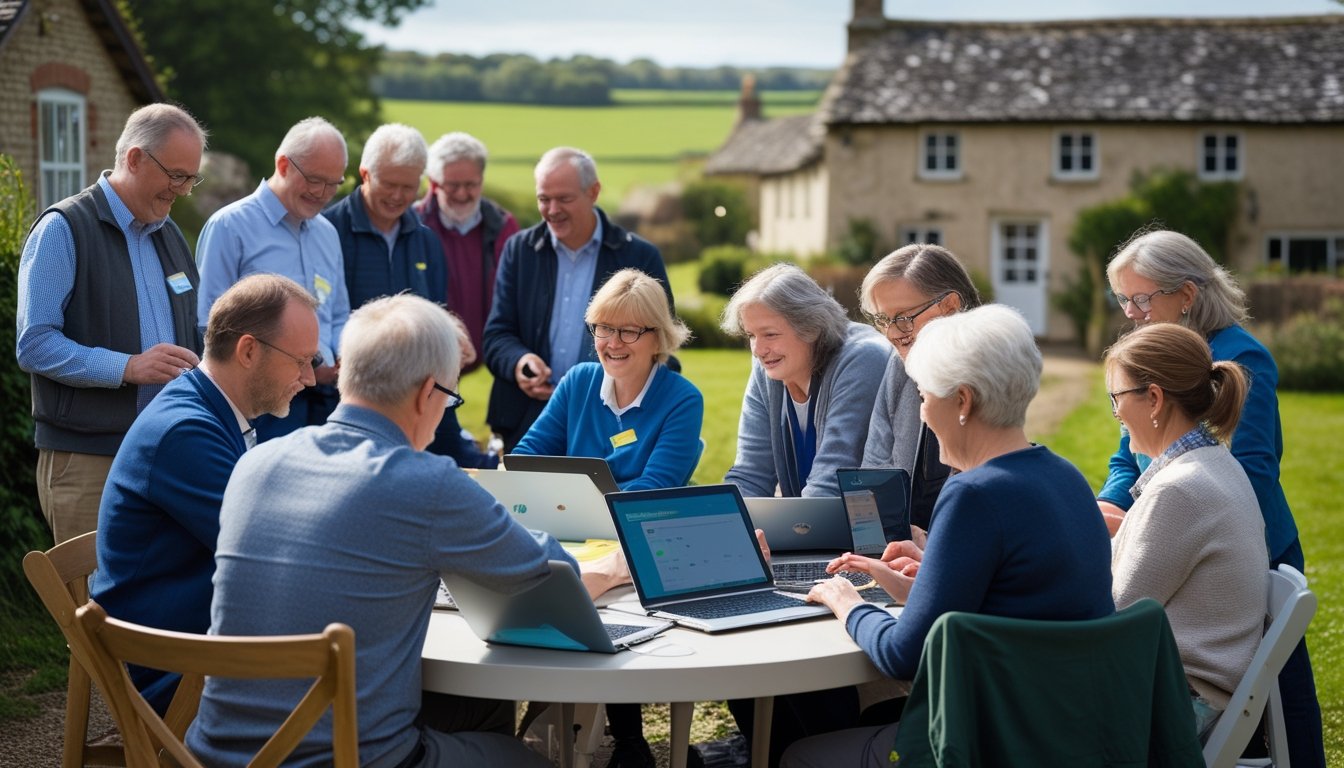Late updated: 25 Aug 2025 15:08
Written by: Oliver Bennett
Maximising Digital Skills for Rural UK Communities: Empowering Local Growth
Maximising digital skills in rural UK communities is not just an aspiration, but an urgent need. With a clear digital divide between urban and rural areas, we face challenges in technology access and skills proficiency. Empowering rural residents with robust digital capabilities can unlock potential for economic growth and improved quality of life.

As digital inclusion becomes a central theme, educational and training initiatives are vital. Projects that enhance connectivity and provide affordable technology can bridge gaps. Local partnerships with libraries and community groups can be instrumental in delivering tailored solutions and support networks.
Key Takeaways
- Digital skills are crucial for rural prosperity.
- Partnerships and training enhance digital inclusion.
- Bridging the digital divide boosts community growth.
Bridging the Digital Divide and Enhancing Digital Inclusion
Ensuring digital inclusion in rural UK communities involves addressing critical barriers such as broadband access and digital literacy. By adopting community-led programmes and enhancing digital skills, we can empower these communities to fully participate in the digital age.
Key Barriers Facing Rural Communities
Rural communities in the UK often face significant challenges in accessing digital technologies. Broadband access is a notable issue, with many areas suffering from slower internet speeds or limited connectivity. This inadequate infrastructure restricts opportunities for remote working, education, and access to online services.
Digital exclusion isn't just about infrastructure. Many rural residents lack the digital skills necessary to engage with technology effectively. This gap can lead to feelings of isolation and limit their ability to take advantage of digital opportunities. Addressing these hurdles is essential to ensure social inclusion and economic participation.
The Role of Digital Literacy and Skills Development
Digital literacy is foundational in bridging the digital divide. We need to focus on skills development to enable individuals in rural areas to use digital tools proficiently. Key skills include using digital devices safely, navigating online platforms, and understanding cybersecurity basics.
Collaboration with organisations like the Good Things Foundation and the Rural Services Network is essential. They provide resources and training to improve digital skills among rural communities. As digital skills become increasingly important, enhancing literacy equates to equipping individuals for better job prospects and improved quality of life.
Community-Led Digital Skills Programmes
Community-led digital skills programmes are key to achieving digital inclusion. These initiatives utilise local resources and partnerships to deliver tailored training sessions. For instance, workshops that focus on practical skills like using email, job searching online, or managing digital finances.
Involving the community in the design and implementation of these programmes ensures that they meet local needs. By incorporating input from diverse community members, we can create more inclusive solutions that benefit everyone. Projects like Winning the Rural Vote emphasise the importance of engaging rural voices in shaping their digital futures.
Empowering local communities through effective digital skills programmes not only enhances digital inclusion but also strengthens community ties and boosts confidence in navigating the digital world.
Building Reliable Digital Infrastructure and Connectivity

Reliable digital infrastructure is essential for economic growth and social inclusion in rural UK communities. Our focus here is to address the main challenges with broadband access and speed, explore investments in high-speed broadband and emerging technologies, and present policy recommendations to enhance rural resilience.
Broadband Access and Speed Challenges
Rural areas often suffer from significant digital connectivity issues, primarily due to inadequate broadband access. Many communities lack high-speed internet, hindering productivity and modern living. The disparity in broadband speeds between urban and rural regions exacerbates these issues, leaving rural areas trailing.
Broadband services are essential for accessing education and healthcare and boosting local economies. Without reliable internet access, rural communities face increased isolation. Improving broadband speed is a critical step toward eliminating these digital divides. Efforts must focus on enhancing connectivity infrastructure to close the gap with urban centres.
Investing in High-Speed Broadband and Future Technologies
Investing in high-speed broadband is vital for the development of rural infrastructure. By focusing on technologies like fibre-optic broadband and 5G, we can bring robust connectivity to rural areas. Successfully deploying these technologies promises to increase productivity and economic growth in these communities.
Private-public partnerships are key to funding and implementing advanced broadband solutions. Implementing innovative wireless technologies can also play a significant role in areas where traditional infrastructure is not feasible. These investments will pave the way for seamless digital inclusion, ensuring that rural areas do not fall behind in the digital age.
Policy Recommendations for Rural Resilience
To achieve lasting improvements in rural digital connectivity, well-crafted policy recommendations are crucial. Policymakers should encourage investment in broadband infrastructure by offering incentives for companies to develop in rural areas. Collaboration between government bodies, local councils, and the private sector can further amplify the impact of these projects.
We must also address affordability issues, ensuring that digital services are accessible to all residents. Implementing targeted initiatives to improve digital literacy and skills is equally important. By fostering a supportive policy environment and bridging the digital divide, we can strengthen rural resilience and ensure equal opportunities for all communities.
Frequently Asked Questions

In addressing the digital skills gap in rural UK communities, strategies, collaborations, and educational programmes are of paramount importance. Here, we explore several key aspects related to enhancing digital literacy and bridging the digital divide.
What strategies can be employed to enhance digital literacy in rural communities within the UK?
We can implement tailored digital literacy programmes that integrate local needs and cultural context. By providing hands-on training specific to rural challenges, and utilising local venues, we offer practical learning opportunities.
How can the digital divide between urban and rural areas in the UK be bridged effectively?
Bridging the divide requires both technological advancements and social interventions. Expanding broadband infrastructure, alongside community training sessions, equips residents to fully engage in digital spaces. Collaborating with technology providers ensures sustainable connectivity solutions.
What are the most effective educational programmes for empowering UK rural residents with digital skills?
Educational initiatives that focus on practical skills, such as digital security and basic computing, are crucial. Programmes like Digital Champions encourage peer learning and support, allowing individuals to learn at their own pace and in their local environment.
Which partnerships are crucial to improve internet connectivity in remote areas of the UK?
Partnerships with private telecommunications companies and local governments can be pivotal. These collaborations often result in increased investment in technological infrastructure, ensuring remote areas receive the same quality of service as urban environments.
What role do local governments play in facilitating digital skill acquisition in rural UK communities?
Local governments can drive change by funding digital literacy programmes and ensuring access to necessary resources. Their role in coordinating community events and training sessions is vital to reaching diverse demographics effectively.
How can community-driven initiatives contribute to elevating digital competencies in rural UK areas?
Grassroots efforts harness local expertise and enthusiasm. By fostering a sense of ownership, community-led initiatives encourage active participation, which results in sustainable skill development and greater digital engagement within the community.
